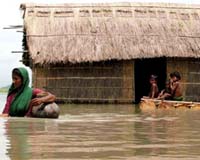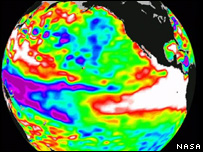Improving the Biodiversity of Watercourses
 We have been looking at ways to improve the biodiversity of watercourses, particularly in farming. This site from the Habitat Inhancement Initiative has a useful guide with some information about improving watercourses, and there is also a guide here for farmers. It is very detailed, and specific to Scotland, but has some good information and diagrams. It might take a while to load.
We have been looking at ways to improve the biodiversity of watercourses, particularly in farming. This site from the Habitat Inhancement Initiative has a useful guide with some information about improving watercourses, and there is also a guide here for farmers. It is very detailed, and specific to Scotland, but has some good information and diagrams. It might take a while to load.
Kissimmee River Restoration

 The Kissimmee river in Florida is a river that was channelised after severe flooding in the 1940s and to assisst flooding. The 160km meandering river was replaced with a 90km drainage basin . However, this river management had severe effects on the river ecosystem, with the massive lost of wetland habitats. The image on the left is before channelisation took place, on the right is after it took place. Just four years after the completion of the river management, the Kissimmee River Restoration Act was passed, and in 1999 the work started on restoring the river to its former state. 11,000 hectares of wetland have been reinstated, and there has been significant growth in the wildlife population and biodiversity. This is an important case study on the restoration of rivers. This is the Kissimmee river restoration site, and there is also some interesting information here.
The Kissimmee river in Florida is a river that was channelised after severe flooding in the 1940s and to assisst flooding. The 160km meandering river was replaced with a 90km drainage basin . However, this river management had severe effects on the river ecosystem, with the massive lost of wetland habitats. The image on the left is before channelisation took place, on the right is after it took place. Just four years after the completion of the river management, the Kissimmee River Restoration Act was passed, and in 1999 the work started on restoring the river to its former state. 11,000 hectares of wetland have been reinstated, and there has been significant growth in the wildlife population and biodiversity. This is an important case study on the restoration of rivers. This is the Kissimmee river restoration site, and there is also some interesting information here.
Bangladesh Flood Control
Bangladesh is a country with three major rivers- the Ganges, Brahmaputra and Meghna all converging, creating a massive drainage basin and deltas. As well as this, the country is very flat and low lying, with 75% of it lying under 10m above sea level. These factors, among others, make Bangladesh extremely prone to flooding. In 1988, there were particularly severe floods, partly down to the heavy monsoon rainfall and the snowmelt from the Himalaya mountains. There is some good general information on wikipedia, or the BBC.With this common of flooding, there is a need for flood control in Bangladesh. For information, try this site or this site about the Flood Action Plan in Bangladesh.
and Meghna all converging, creating a massive drainage basin and deltas. As well as this, the country is very flat and low lying, with 75% of it lying under 10m above sea level. These factors, among others, make Bangladesh extremely prone to flooding. In 1988, there were particularly severe floods, partly down to the heavy monsoon rainfall and the snowmelt from the Himalaya mountains. There is some good general information on wikipedia, or the BBC.With this common of flooding, there is a need for flood control in Bangladesh. For information, try this site or this site about the Flood Action Plan in Bangladesh.
2007 set to be 'warmest on record"

The Met Office has recently said that 2007 is set to be the warmest year on record, with a 60% chance that the average surface temperature will match or exceed the current record from 1998. This has been caused by the El Nino weather event in the Pacific Ocean and Global Warming. For more information, read this BBC article, or try national geographic.
 We have been looking at ways to improve the biodiversity of watercourses, particularly in farming. This site from the Habitat Inhancement Initiative has a useful guide with some information about improving watercourses, and there is also a guide here for farmers. It is very detailed, and specific to Scotland, but has some good information and diagrams. It might take a while to load.
We have been looking at ways to improve the biodiversity of watercourses, particularly in farming. This site from the Habitat Inhancement Initiative has a useful guide with some information about improving watercourses, and there is also a guide here for farmers. It is very detailed, and specific to Scotland, but has some good information and diagrams. It might take a while to load.




